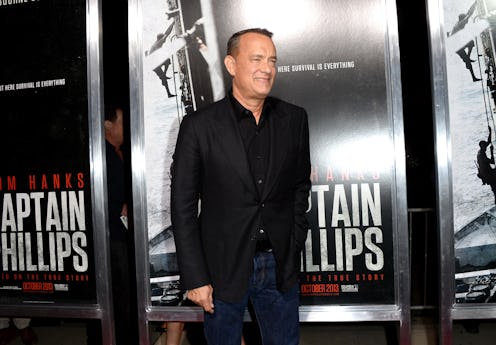Entertainment
Our Portrayal of Soldiers Is Regressing
Propaganda or protester? Over the years, American soldiers in the movies have fluctuated between both, eventually ending up at something close to actual human beings who have enlisted in service. But from early reviews of Tom Hanks' new film Captain Phillips, it seems that the movie has regressed to portraying American soldiers as nothing but strong, almost mechanical instruments of conflict.
Andrew O'Hehir's Salon review of Tom Hanks' performance as Captain Phillips is glowing, in line with many early reactions to the film. But O'Hehir suggests that problems arise in the movie in its portrayal of characters other than Phillips: namely, the Somali pirates that take him hostage and the military personnel that save him.
Director Paul Greengrass, a specialist in political thrillers who made United 93, Bloody Sunday and the second and third Bourne adventures, has never before made anything this propagandistic or this characterless. His portrayal of the enormous United States military operation to free Phillips from his captors has the calm technological blankness of a Navy commercial, without the 1970s waka-waka guitar. I can’t decide if there’s meant to be anything sardonic about the presentation of the asymmetrical conflict in Captain Phillips: Billions of dollars of cutting-edge military hardware and hundreds of corn-fed, gym-toned Americans on one side, four malnourished men with black-market Kalashnikovs on the other. But I kind of think there isn’t.
It's not much of a surprise. Greengrass directed another political thriller, Green Zone, that sorely underdeveloped Matt Damon's soldier character in order to carry out Greengrass' heavy-handed indictment of the Iraq war. It's a thrilling action movie, but in light of the complex portrayals of soldiers in post-Iraq war films, movies like Green Zone and Captain Phillips recall the more shallow war films from decades ago.
From the 1940s to the 1960s, war films served primarily as vehicles for propaganda and patriotism. Stars like Cary Grant or John Wayne played either stalwart, honorable soldiers or conniving villains, but never a shade in between.
During the 1960s and '70s, war served as the backdrop for action or comedy, like in The Dirty Dozen or M.A.S.H. But there were rarely statements on the fighting itself, and even the mindset of the soldiers during conflict is usually not explored. The soldiers described in Captain Phillips seem almost from times past in this way: either good or bad people, and never shown any empathy or introspection.
But war movies have grown incredibly in their emotional range since then. There were a whole slew of films in reaction to the Vietnam War that showed the emotional and mental breakdowns of soldiers under pressure such as Apocalypse Now, Full Metal Jacket, The Deer Hunter, and Taxi Driver. These films gave us some of the best cinema of the '70s and '80s, not just because they were critical of the Vietnam War, but because they were interested in what happens to the people who had to make the kind of decisions that war forces one to make.
After the '90s, there was a slew of films that dealt with World War II, most extolling the virtues of the men who fought in that war. But after the United States entered the Iraq War, war took on a new meaning for American audiences. This was a real, highly protested conflict that risked the lives of friends and neighbors. The media coverage seemed just as conflicted as the returning soldiers, some of whom were diagnosed with Post Traumatic Stress Disorder.
Thus, some war movies started to reflect this reality. Movies like Jarhead, Brothers and Buried were intimate portrayals of soldiers themselves. None blamed the reasons or the politics behind the war, preferring to focus on the emotional reactions of the soldiers to the war, who are by turns nostalgic, impatient, angry, and depressed. Kathryn Bigelow has been the most adept at this approach, reflecting on the toll that war takes on people even in an action-driven film like Zero Dark Thirty.
Although the Iraq War may be more or less past us now, we cannot forget what we learned as a culture during those years. Conflicts are not just black and white. There are no good guys and bad guys, even in war. And soldiers are not just shiny, magnificent pawns to be moved around on missions, to kill the bad guys and save the good guys. They're real people who have to make difficult decisions and witness terrible things, and movies help us to understand that, especially in difficult times. Let's not forget that.
